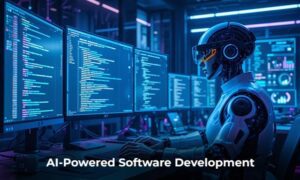The rapid evolution of technology has transformed the landscape of cybersecurity, particularly in cloud environments. As businesses increasingly migrate their operations to the cloud, the need for robust security measures has never been more pressing. AI-powered cloud security solutions are emerging as a critical component in defending against sophisticated cyber threats. By harnessing the capabilities of artificial intelligence, organizations can enhance their security posture, improve threat detection, and respond to incidents more effectively. This article explores the role of AI in cloud security, its benefits, challenges, and future trends shaping the industry.
Understanding AI-Powered Cloud Security
What is AI-Powered Cloud Security?
AI-powered cloud security refers to the use of artificial intelligence and machine learning technologies to protect cloud-based systems and data from cyber threats. These solutions analyze vast amounts of data in real-time to identify anomalies, detect potential breaches, and automate responses to incidents. Unlike traditional security measures that rely on predefined rules, AI-driven systems continuously learn from new data and adapt their defenses accordingly.
Importance of AI in Cloud Security
- Proactive Threat Detection: AI systems can analyze patterns in user behavior and network traffic to identify potential threats before they escalate into serious incidents.
- Automated Responses: By automating threat response protocols, organizations can reduce response times significantly, minimizing damage from cyberattacks.
- Enhanced Accuracy: Machine learning algorithms improve over time, leading to more accurate threat identification and reduced false positives.
The Role of Machine Learning in Cloud Security
Continuous Learning
Machine learning models are designed to learn from historical data and adapt based on new information. This continuous learning process enables AI systems to recognize evolving threats and adjust their detection methods accordingly.
Example: A financial institution employs machine learning algorithms that analyze transaction patterns to detect fraudulent activities in real-time. As new fraud techniques emerge, the system learns from these patterns and updates its detection criteria.
Anomaly Detection
AI-powered security solutions excel at detecting anomalies within large datasets. By establishing a baseline of normal behavior, these systems can flag unusual activities that may indicate a security breach.
Example: A cloud service provider utilizes AI algorithms to monitor user access patterns. If an account suddenly exhibits atypical behavior—such as accessing sensitive data from an unusual location—the system triggers an alert for further investigation.
Benefits of AI-Powered Cloud Security
- Improved Threat Intelligence
AI-driven platforms can aggregate threat intelligence from multiple sources, providing organizations with real-time insights into emerging threats and vulnerabilities. This capability allows for informed decision-making regarding security measures.
Example: Cybersecurity firms use AI to analyze global threat data, enabling organizations to stay ahead of potential attacks by implementing proactive measures based on current trends.
- Cost Efficiency
By automating routine security tasks and reducing the need for extensive manual oversight, organizations can achieve significant cost savings while maintaining a high level of security.
Example: Companies that implement AI-driven security solutions often find that they can reduce their reliance on large security teams while still effectively managing threats.
- Scalability
AI-powered solutions can easily scale with an organization’s growth. As businesses expand their cloud environments, AI systems can adapt to increased workloads without compromising performance or security.
Example: An e-commerce platform experiencing seasonal spikes in traffic can utilize AI-based security measures that automatically adjust resource allocation based on real-time demand.
Challenges in Implementing AI-Powered Cloud Security
- Data Privacy Concerns: The use of AI in cloud security raises significant data privacy issues. Organizations must ensure that sensitive information is handled responsibly and complies with regulations such as GDPR or HIPAA.
- Complexity of Integration: Integrating AI technologies into existing cloud infrastructures can be complex and may require significant changes to workflows or processes.
- Skill Shortages: The successful implementation of AI-powered cloud security requires skilled personnel who understand both cybersecurity principles and machine learning technologies—a challenge many organizations face.
Real-World Applications of AI in Cloud Security
Example 1: Automated Threat Detection
Leading tech companies are utilizing AI-driven platforms for automated threat detection across their cloud environments. These platforms continuously scan for vulnerabilities and potential breaches, allowing organizations to respond swiftly.
Case Study: A major tech firm implemented an AI-based security solution that reduced incident response times by 70%, significantly minimizing potential damage from cyberattacks.
Example 2: Enhanced User Authentication
AI technologies are being used to strengthen user authentication processes through behavioral biometrics. By analyzing user behavior patterns—such as typing speed or mouse movements—organizations can detect anomalies that may indicate unauthorized access attempts.
Case Study: A financial services provider adopted an AI-driven authentication system that flagged unusual login attempts based on user behavior analysis, preventing unauthorized access before it could occur.
Future Trends in AI-Powered Cloud Security
- Increased Use of Predictive Analytics
The future will see a greater emphasis on predictive analytics within AI-powered cloud security solutions. By analyzing historical data combined with real-time insights, organizations will be able to anticipate potential threats before they materialize.
- Greater Focus on User Education
As cyber threats evolve, educating users about safe practices will become increasingly important. Organizations will need to invest in training programs that inform employees about recognizing phishing attempts and other common attack vectors.
- Development of Ethical Guidelines
With the growing reliance on AI technologies for cybersecurity, establishing ethical guidelines for their use will be essential. Organizations must navigate the balance between effective threat detection and respecting user privacy rights.
Conclusion
AI-powered cloud security is reshaping how organizations approach cybersecurity in an increasingly digital world! By harnessing advanced technologies such as machine learning for threat detection while addressing challenges related to privacy concerns or integration complexities—businesses can strengthen their defenses against evolving cyber threats!
As we look toward the future—organizations must remain vigilant not only in adopting innovative solutions but also ensuring responsible practices surrounding ethical considerations within this rapidly changing landscape! Embracing these advancements will empower businesses to not only protect their digital assets effectively but also foster trust among customers while contributing positively toward creating safer online environments.
About Vidyasagar Vangala
Vidyasagar Vangala is an accomplished IT Project Lead with 10 + years of IT industry experience with a deep passion for technology and innovation. With extensive expertise in Cloud Technologies, AI Integration, and Automation, Vidyasagar has been at the forefront of driving transformative projects that deliver tangible business outcomes. His robust experience in DevOps engineering, cloud platforms like AWS and Azure, and Kubernetes showcases his ability to lead large-scale cloud migrations, develop AI-powered solutions, and implement advanced automation frameworks.
A strategic thinker and problem solver, Vidyasagar thrives on tackling complex challenges and delivering scalable, efficient solutions. His professional journey reflects a commitment to leveraging cutting-edge tools and methodologies to help organizations achieve agility and operational excellence. Whether it’s streamlining processes through DevOps practices or integrating AI to enhance business decision-making, Vidyasagar’s innovative mindset and leadership have consistently resulted in successful project deliveries.
For more updates visit his website https://vangala.me/



































